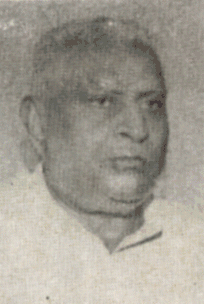Natvarsinh Solanki
Natvarsinhji Kesarsinhji Solanki was a Rajput politician, founder of Charotar Kshatriya Samaj and Gujarat Kshatriya Sabha.[1][2] He was elected to the Lok Sabha, the lower house of the Parliament of India.[3][4]
Thakor Sri Natvarbhai Solanki | |
|---|---|
| નટવરભાઈ સોલંકી | |
 Natvarsinhji Solanki | |
| Born | Natvarbha 13th January 1915 |
| Nationality | British Indian |
| Education | Baroda College, Bombay University |
| Occupation | Former Jagirdar, Politician, Local Leader, Agriculturist |
| Organization | Gujarat Kshatriya Sabha |
| Known for | President of Gujarat Kshatriya Sabha, Who bring |
| Title | Founder and President of Charotar Kshatriya Koli Samaj, Gujarat Kshatriya Sabha
Mla, Bombay Legislative Assembly 1952-57, Gujarat Legislative Assembly 1967-72 Mp of 7th Lok Sabha 1980-84 |
| Political party | Congress (i) |
| Movement | Kshatriya Movement |
| Spouse(s) | Vasantkunverba |
| Partner(s) | = 3 |
Natvarsinh Solanki was an elite Rajput who was running 'Charotar Kshatriya Samaj' but later he was made co-editor of ' Bandu ' organisation by in 1947. Solanki and Mahida both decided to form an organization called Gujarat Kshatriya Sabha, which would be for the Rajput and the Koli castes and would benefit both the castes. Koli will be considered Kshatriya and Rajputs will benefit in the politics of Gujarat as Koli caste has the highest population in Gujarat and both are enemies of Patidar caste.[2]
References
- Kothari, Rajni; Maru, Rushikesh (2004) [2002]. "Federating for Political Interests: The Kshatriyas of Gujarat". In Shah, Ghanshyam (ed.). Caste and Democratic Politics in India. Anthem Press. pp. 179–180. ISBN 978-1-84331-085-3.
At the same time, Natvarsinh Solanki, another educated Rajput, a talukdar6 of Kaira district, a skilful organiser and one with bitter experience of the politically dominant Patidars, was running an association called the Charotar Kshatriya Samaj.
- Lobo, Lancy (1995). The Thakors of North Gujarat: A Caste in the Village and the Region (Study of the Kolis based in north Gujarat). New Delhi: Hindustan Publishing Corporation. p. 167. ISBN 81-7075-035-0.
- India. Parliament. Lok Sabha (1988). Parliamentary Committee: Summary of Work. Lok Sabha Secretariat. p. 29. Retrieved 3 November 2020.
- Ghanshyam Shah (2004). Caste and Democratic Politics in India. Permanent Black. pp. 252–. ISBN 978-81-7824-095-4. Retrieved 1 December 2020.